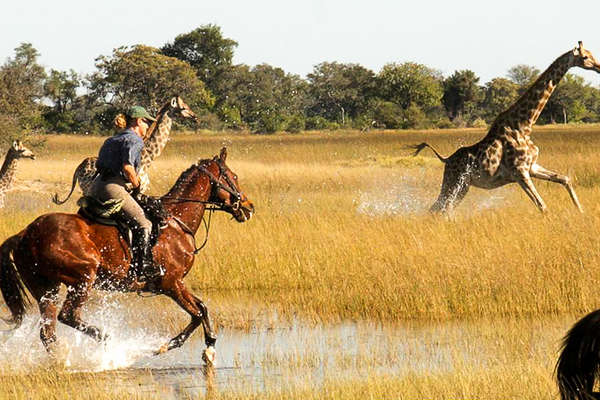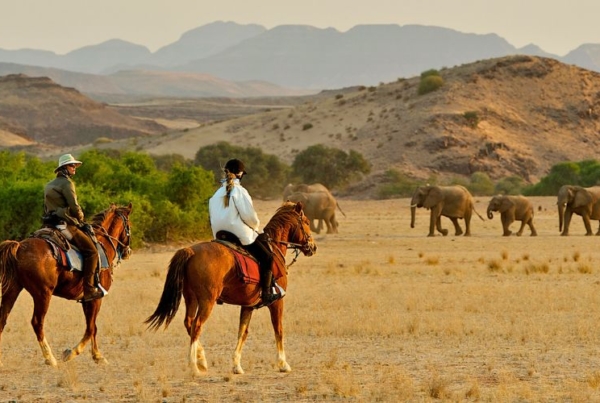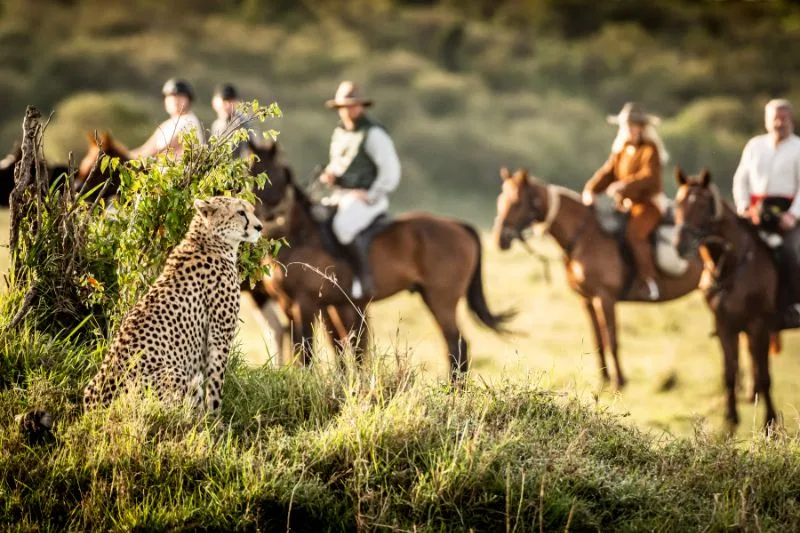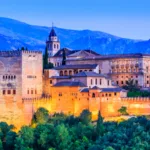Embark on an adventure like no other with African Horse Safaris. Imagine exploring the vast landscapes of Africa, not by jeep, but on horseback.
African Horse Safaris offer a unique way to experience the continent’s diverse wildlife and stunning scenery. Riding through the savannahs and bushlands brings you closer to nature than ever before. The rhythmic pace of the horse allows for a tranquil and immersive journey.
Along the way, you’ll encounter elephants, giraffes, and even lions in their natural habitats. This intimate connection with the environment makes each safari a memorable experience. Whether you’re an experienced rider or a beginner, these safaris cater to all levels. Ready to saddle up and discover Africa from a new perspective? Let’s explore the magic of African Horse Safaris.
Introduction To African Horse Safaris
Ever dreamt of galloping alongside zebras or cantering past a herd of elephants? Welcome to the world of African Horse Safaris! These safaris offer a unique and intimate way to experience the stunning landscapes and wildlife of Africa. Imagine exploring vast savannas, dense forests, and serene riverbanks, all while on horseback. Let’s dive into what makes African Horse Safaris an unforgettable adventure.
What To Expect
On an African Horse Safari, you’ll encounter a rich tapestry of wildlife and breathtaking landscapes. From the moment you mount your horse, you’ll be transported into a world where the call of the wild is your soundtrack and the beauty of nature is your backdrop. Here’s a glimpse of what awaits:
- Wildlife Encounters: Get up close and personal with Africa’s iconic animals, including elephants, lions, giraffes, and more.
- Scenic Rides: Traverse diverse terrains, from open plains to lush forests, each offering its own unique charm.
- Local Culture: Engage with local communities and learn about their traditions and way of life.
- Professional Guides: Benefit from the expertise of experienced guides who ensure a safe and enriching experience.
Why Choose Horseback
Why opt for a horseback safari over a traditional vehicle-based tour? Here are some compelling reasons:
- Closer to Nature: Horses allow you to move quietly through the wilderness, offering a more immersive experience.
- Unique Perspective: Being on horseback gives you a higher vantage point, perfect for spotting wildlife.
- Eco-friendly: Horseback safaris have a lower environmental impact compared to motorized tours.
- Adventure: Riding through the wilds of Africa adds an element of excitement and adventure to your safari.
In conclusion, an African Horse Safari is more than just a vacation; it’s an adventure of a lifetime. Whether you’re a seasoned rider or a novice, these safaris offer something for everyone. So saddle up and get ready to create memories that will last forever!

Top Destinations
Dreaming of an unforgettable African horse safari? Some destinations stand out. They offer unique experiences, stunning landscapes, and rich wildlife. Let’s explore the top destinations for African horse safaris.
Botswana
Botswana is a top choice for horse safaris. It boasts vast wetlands and open savannas. The Okavango Delta is a highlight. You can ride through its waterways and spot elephants, lions, and hippos. The scenery is breathtaking. The wildlife is abundant. Experienced guides ensure safety and provide rich knowledge.
In the Makgadikgadi Pans, you can experience stark beauty. The salt flats stretch endlessly. During the rainy season, the area transforms. Flamingos and zebras flock to the pans. Horseback provides a unique way to witness this transformation. Botswana offers a diverse and thrilling safari experience.
Namibia
Namibia offers a different but equally stunning landscape. The Namib Desert is a prime location for horse safaris. Ride through towering dunes and vast plains. The desert scenery is dramatic. You might see oryx, springbok, and other desert-adapted animals. The Skeleton Coast adds a mysterious allure. Its shipwrecks and foggy coastline are iconic.
The Damaraland region is also worth exploring. It features rugged terrain and ancient rock art. Desert elephants roam here. Horse safaris in Namibia offer a blend of adventure and natural beauty. The vast, open spaces provide a sense of freedom. Namibia is a unique destination for horse lovers.
Unique Wildlife Encounters
When you think of Africa, the first thing that might come to mind is its incredible wildlife. An African Horse Safari offers an extraordinary way to experience these animals up close. Imagine riding through vast savannahs, feeling the thrill of encountering majestic creatures in their natural habitat. Here, we explore some unique wildlife encounters that make African Horse Safaris truly unforgettable.
Big Five Sightings
One of the most exhilarating aspects of an African Horse Safari is the chance to see the Big Five: lions, leopards, rhinoceros, elephants, and Cape buffalo. These animals are not just the stars of the safari but also symbols of the wild African landscape.
- Lions: Feel your heart race as you spot a lion pride lounging in the grass, their golden eyes watching your every move.
- Leopards: Catch a glimpse of these elusive cats as they slink through the bush, their spotted coats blending seamlessly with the environment.
- Rhinoceros: Marvel at the sheer size and power of these ancient creatures as they graze peacefully or wallow in mud.
- Elephants: Observe family groups of elephants as they use their trunks with surprising dexterity, playing and feeding together.
- Cape Buffalo: Admire the impressive horns of the Cape buffalo, often seen grazing in herds and always alert to potential threats.
Bird Watching
For bird enthusiasts, an African Horse Safari is a veritable paradise. The continent boasts over 2,300 bird species, offering endless opportunities for bird watching.
| Bird | Description |
|---|---|
| African Fish Eagle: | Listen for its distinctive call and watch as it swoops down to catch fish from lakes and rivers. |
| Ostrich: | The world’s largest bird, often seen striding across the plains with its long legs and neck. |
| Lilac-breasted Roller: | Admire its vibrant plumage as it performs acrobatic flights in pursuit of insects. |
| Secretary Bird: | Spot this unique bird of prey walking on the ground, hunting for snakes and other small animals. |
These are just a few examples, but each ride brings the possibility of discovering new and fascinating birds. Whether you’re an experienced birder or a curious beginner, the diversity and beauty of African birds will leave you in awe.
Embarking on an African Horse Safari is not just about the thrill of the ride but also the incredible wildlife encounters that make every moment unforgettable. So, saddle up and prepare for an adventure like no other!
Cultural Experiences
Embarking on an African Horse Safari offers more than just breathtaking landscapes and wildlife. It provides an immersive cultural experience. You will have the chance to interact with local tribes, savor traditional cuisine, and learn about age-old customs. These cultural experiences add depth and richness to your safari adventure.
Local Tribes
Meeting local tribes is a highlight of an African Horse Safari. Tribes such as the Maasai and the Himba welcome visitors warmly. You can learn about their daily lives, traditions, and histories. Witness traditional dances and ceremonies. These interactions give you a deeper understanding of their unique cultures.
Traditional Cuisine
Traditional cuisine is a significant part of the cultural experience. Enjoy dishes like Ugali, a staple in many East African countries. Savor the flavors of local meats and vegetables. Meals often include fresh, locally-sourced ingredients. Each dish tells a story of the region’s history and lifestyle. Eating like a local enriches your safari adventure.
Preparation Tips
So, you’ve decided to embark on the adventure of a lifetime with an African horse safari! How exciting! But before you saddle up and ride into the sunset, there are a few important things you need to prepare. From fitness requirements to essential gear, here’s a handy guide to ensure you’re ready for this unforgettable experience.
Fitness Requirements
First things first, let’s talk about fitness. Horseback riding might look easy, but it requires a good level of physical fitness. You don’t need to be an athlete, but being in decent shape will make your safari much more enjoyable.
Here are some fitness tips to get you ready:
- Cardio Exercises: Engage in cardio workouts like jogging, cycling, or swimming. These will help you build stamina.
- Strength Training: Focus on exercises that strengthen your core, legs, and back. Think squats, planks, and lunges.
- Stretching: Flexibility is key. Incorporate yoga or simple stretching routines to stay limber.
Remember, the better shape you’re in, the more you’ll enjoy the ride!
Essential Gear
Now that your body is ready, let’s talk about the gear you’ll need. Proper equipment can make a big difference in your comfort and safety.
Here’s a checklist of essential items:
| Item | Purpose |
|---|---|
| Riding Helmet | Protects your head in case of falls |
| Riding Boots | Provides ankle support and protection |
| Comfortable Clothing | Wear breathable, moisture-wicking fabrics |
| Gloves | Protects your hands and improves grip |
| Sun Protection | Bring a hat, sunglasses, and sunscreen |
Additionally, don’t forget to pack a small first aid kit, a water bottle, and some snacks. You never know when you might need a quick energy boost!
With these preparation tips, you’re well on your way to having an amazing African horse safari. So, start getting fit, gather your gear, and get ready for an adventure you’ll never forget!
Safety Considerations
Embarking on an African horse safari is an exciting adventure. Imagine riding through vast savannas, spotting elephants and lions along the way. But before you saddle up, let’s talk about safety. Ensuring a safe trip is key to enjoying this unique experience. From guided tours to health precautions, here’s what you need to know.
Guided Tours
Guided tours are the best way to stay safe on your horse safari. Experienced guides know the terrain, wildlife behavior, and the safest routes. They can spot potential dangers long before you do. Think of them as your safety net. Plus, they have fascinating stories and knowledge about the local area. Did you know that zebras have unique stripes, much like human fingerprints? Your guide will keep you informed and entertained.
When choosing a tour, consider the following:
- Reputation of the tour company
- Experience level of the guides
- Group size (smaller groups are often safer)
A well-reviewed company with experienced guides ensures you get the most out of your safari while staying safe.
Health Precautions
Staying healthy on your safari is just as important as staying safe. Africa’s landscape and climate can be challenging, so it’s crucial to prepare. Here are some key health precautions:
- Vaccinations: Ensure you are up-to-date on vaccinations, especially for diseases like yellow fever and hepatitis.
- Medication: Bring any prescribed medicines and a basic first-aid kit. Malaria prevention tablets are also a good idea.
- Hydration: Drink plenty of water. The African sun can be intense, and it’s easy to get dehydrated. Carry a reusable water bottle and sip regularly.
- Sun Protection: Wear sunscreen, a hat, and sunglasses to protect yourself from the sun’s rays.
Remember, it’s better to be safe than sorry. Taking these health precautions means you can focus on enjoying the adventure.
Safety on an African horse safari is all about preparation and awareness. By choosing reputable guided tours and taking the right health precautions, you ensure a memorable and safe experience. So, are you ready to ride into the wild and create unforgettable memories?
Best Times To Visit
Planning an African horse safari? Fantastic choice! The best time to visit is one of the most crucial decisions you’ll make. Why, you ask? Well, the timing can influence everything from animal sightings to your overall comfort and enjoyment. Let’s dive into the best times to embark on this thrilling adventure.
Seasonal Highlights
Africa’s seasons can greatly affect your horse safari experience. Here’s a quick rundown:
- Dry Season (June to October): The dry season is generally considered the best time for safaris. The weather is cooler, and animals gather around waterholes, making them easier to spot. The landscapes are less lush, offering clearer views.
- Example: Imagine trotting alongside a herd of elephants as they make their way to the watering hole. Breathtaking, right?
- Wet Season (November to May): This period brings lush, green landscapes and fewer tourists. While animal spotting can be a bit more challenging due to dense vegetation, the scenery is absolutely stunning. Plus, it’s the birthing season for many animals, so you might see some adorable baby animals.
- Example: Picture yourself riding through verdant plains, with the occasional baby zebra peeking out from behind its mother. It’s like being in a nature documentary!
Climate Factors
The climate in Africa varies significantly depending on the region. Here’s a table to help you understand the general climate patterns:
| Region | Dry Season | Wet Season |
|---|---|---|
| East Africa (Kenya, Tanzania) | June to October | March to May, November |
| Southern Africa (Botswana, South Africa) | May to October | November to April |
Pro Tip: Always check specific weather forecasts for the region you plan to visit. Weather can be unpredictable, and it’s better to be prepared.
In summary, the best time to visit for an African horse safari depends on what you want to experience. Whether it’s the bustling animal activity of the dry season or the tranquil beauty of the wet season, each has its unique charm. So, saddle up and get ready for the adventure of a lifetime!

Sustainable Tourism
Sustainable tourism is a hot topic these days, and rightly so. When it comes to African Horse Safaris, sustainability isn’t just a buzzword; it’s a way of life. Riding through the breathtaking landscapes of Africa, you can witness the majestic wildlife while knowing that your adventure is contributing to the preservation of these natural wonders. Let’s dive into how African Horse Safaris are leading the way in sustainable tourism.
Eco-friendly Practices
One might think, “How can horse riding be eco-friendly?” Well, let me tell you, African Horse Safaris have mastered the art. Here are some of the eco-friendly practices they follow:
- Minimal Footprint: Horses tread lightly on the land, causing less erosion compared to vehicles.
- Organic Feed: The horses are fed organic, locally-sourced hay and grains, reducing the carbon footprint.
- Waste Management: Waste is managed responsibly, with composting systems for manure.
- Reusable Resources: They use reusable water bottles and avoid plastic packaging, keeping the environment clean.
By adopting these practices, African Horse Safaris ensure that their tours are as gentle on the environment as the breeze that rustles the savannah grass.
Supporting Local Communities
Supporting local communities is a cornerstone of sustainable tourism, and African Horse Safaris excel in this area. Here’s how they make a difference:
- Employment Opportunities: Many guides, caretakers, and staff are locals, providing stable jobs and income.
- Cultural Exchange: Visitors get the chance to engage with local cultures, enhancing mutual respect and understanding.
- Education Programs: Portions of the safari fees are invested in local schools and educational programs, fostering future leaders.
- Fair Trade: Souvenirs and crafts sold during the safaris are sourced from local artisans, ensuring fair trade and supporting local economies.
By riding with African Horse Safaris, you’re not just a tourist; you’re a contributor to a brighter, more sustainable future for these communities.
So, next time you think of an adventure, consider an African Horse Safari. It’s not just a thrilling experience but also a step towards preserving the beauty of our planet and supporting the wonderful people who call it home. Ever wondered how it feels to ride into the sunset knowing you’re making a difference? Now, you can find out!
Testimonials
Considering an African Horse Safari? You’re not alone! Many adventurers have taken the plunge and come back with stories to tell. Here, we share some of their experiences and expert advice to help you make the most of your journey.
Traveler Stories
Ever wondered what it’s like to ride through the African savanna? Let’s hear from those who have been there and done that. Their stories might just inspire you to saddle up!
| Traveler | Testimonial |
|---|---|
| Jane from Australia | “The sights, sounds, and sheer thrill of riding alongside zebras were unforgettable. The guides were knowledgeable, and the horses were well-trained. I felt safe and adventurous all at once.” |
| Mark from USA | “I had never ridden a horse before, but the team made sure I was comfortable. By the end of the trip, I felt like a pro! The beauty of the African landscape is something everyone should experience.” |
Expert Recommendations
Looking for tips to make your safari even better? We’ve got you covered. Here are some expert recommendations to ensure your adventure is both safe and memorable:
- Choose the right season: Dry seasons are generally best for wildlife viewing.
- Pack light but smart: Bring essentials like sunscreen, a hat, and comfortable clothing.
- Stay hydrated: The African sun can be intense, so drink plenty of water.
- Trust your guides: They know the terrain and the animals. Listen to their advice.
So, what are you waiting for? Dive into the adventure of a lifetime with an African Horse Safari. Whether you’re a seasoned rider or a complete beginner, there’s something magical waiting for you in the heart of Africa.
Frequently Asked Questions
Which Country Is Famous For Horse Safaris?
Botswana is famous for horse safaris. It offers unique and thrilling experiences in the Okavango Delta. Explore wildlife on horseback.
Are Horse Riding Safaris Safe?
Yes, horse riding safaris are generally safe. Professional guides ensure safety and provide well-trained horses. Always follow their instructions.
Is African Horse Sickness A Virus?
Yes, African horse sickness is a virus. It affects horses, mules, and donkeys, causing severe illness.
What Is The Weight Limit For The African Horse Safari?
The weight limit for the African horse safari is 210 pounds (95 kilograms). This ensures the safety and comfort of both riders and horses.
Conclusion
African horse safaris offer unforgettable experiences. Imagine riding through stunning landscapes. Feel the thrill of the wild. Connect with nature in a unique way. These safaris provide adventure and serenity. Perfect for nature lovers and thrill-seekers. Plan your trip today.
Discover Africa’s beauty on horseback. Create memories that last a lifetime. Enjoy the journey.



